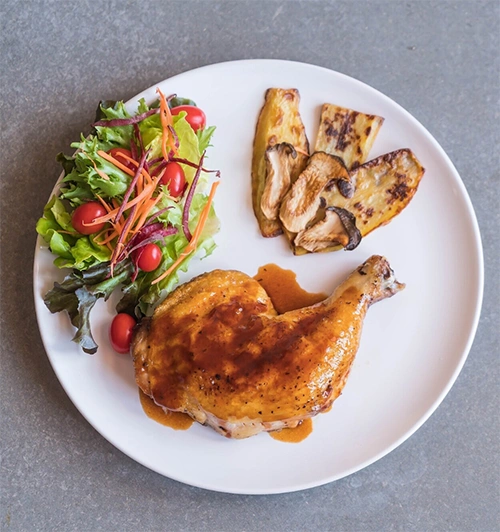

Top Health Benefits of Duck Confit You Need to Know
Duck confit is a nutrient-dense dish that offers a rich source of high-quality protein, essential amino acids, and beneficial fats, especially monounsaturated and saturated fats from duck fat. The duck leg itself is an excellent source of iron, zinc, and B vitamins, particularly B12 and niacin, which support energy metabolism and red blood cell production. When paired with roasted vegetables and a fresh salad, as in this version, the meal also provides dietary fiber, antioxidants, and a variety of vitamins such as A, C, and K. Despite its richness, duck confit can be a balanced dish when consumed in moderation, offering both satiety and nourishment while being naturally low in carbohydrates, making it suitable for low-carb and high-protein diets.
Recipe :
For 4 people
Enjoy your rich and flavorful homemade Duck Confit!
Preparing duck confit requires patience and precision to achieve the ideal texture—tender meat that effortlessly falls off the bone and perfectly crispy skin. One of the most crucial steps is the marination process, where the duck legs are cured with salt, herbs (like thyme, bay leaves, and garlic), and sometimes spices for 12 to 24 hours. This step enhances flavor and preserves the meat. When cooking, it's essential to submerge the duck fully in its own rendered fat and cook it slowly at a low temperature (around 90–100°C / 200–210°F) for 2.5 to 3 hours. Afterward, refrigerating the duck in its fat helps intensify the flavor and makes it easy to reheat and crisp up before serving. Maintaining low heat during the confit process and not rushing the final sear are both key to success.

Duck confit aligns well with several dietary approaches, particularly ketogenic, paleo, gluten-free, and Mediterranean diets due to its high fat, low carbohydrate profile and clean, whole-food ingredients. It is especially beneficial for high-protein diets given the substantial protein content in duck meat. However, it is not suitable for vegan or vegetarian diets due to the animal origin of both the meat and the fat. Those following a low-calorie or DASH (Dietary Approaches to Stop Hypertension) regimen may find the dish too rich in fat and sodium, particularly if traditional curing methods are used. For those practicing intermittent fasting, duck confit could serve as a nutrient-rich and satisfying main meal during eating windows, but portion control is recommended due to its calorie density.
alina (May 23, 2025, 7:33 a.m.) : The slow cooking in duck fat makes it incredibly tender and full of flavor. Paired with earthy mushrooms or crisp greens, it’s a classic French delight worth every step.